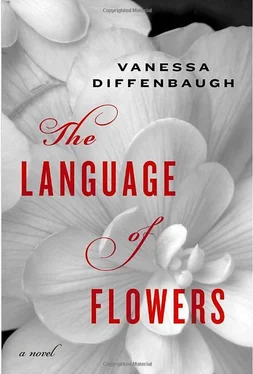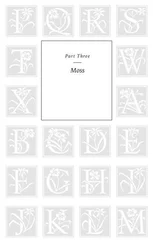For the next four days I slept, showered, and ate the remains of tourists’ lunches on Columbus Avenue. When my nights ended at the hostel, I moved back to the park, worried about the overgrown boy and the dozens of others like him but aware that I had few other options. I tended my garden and waited for the weekend.
On Friday I stayed awake, worried I might sleep late and miss Renata. I wandered the streets all night, pacing outside the club at the bottom of the hill when I got tired, the music vibrating against my falling eyelids. When Renata’s car pulled up, I was leaning against the locked glass door of Bloom, waiting.
She barely slowed enough for me to jump into the truck, and started her U-turn before I closed the door.
“I should have told you four,” she said. “I didn’t check my book. We need flowers for forty tables today, and the wedding party is over twenty-five people. Who has a wedding with twelve bridesmaids?” I couldn’t tell if she was asking me or if it was a rhetorical question. I stayed silent. “If I married, I wouldn’t even have twelve guests,” she added, “at least not in this country.”
I wouldn’t have one guest , I thought, in this country or any other . She slowed at the roundabout and remembered her turn.
“Earl came in,” she said. “He wanted me to tell you his granddaughter was happy—he said it was important that I said ‘happy’ and not some other word. He said you did something with the flowers to bring it out of her.”
I smiled and looked out the window, away from Renata. So he had remembered. Surprisingly, I did not regret the decision to divulge my secret. But I didn’t want to tell Renata. “I don’t know what he’s talking about,” I said.
She glanced from the road to my face and back again, one eyebrow raised in question. After a stretch of silence, she continued. “Well, Earl is a funny old man. Angry, mostly, but occasionally soft in ways you wouldn’t expect. He told me yesterday he’s old enough to have given up on God and come back around.”
“What did he mean by that?”
“I’m guessing he thinks you consulted with Him before choosing the flowers last weekend.”
I snorted. “Ha.”
“Yeah, I know. But he told me he’s coming back today, and he wants you to pick out something for his wife.”
I felt a quick thrill at having been given a new assignment.
“What’s she like?” I asked.
“Quiet,” Renata said, shaking her head. “I don’t know much more than that. Earl told me once that she was a poet, but she rarely speaks and never writes anymore. He brings her flowers nearly every week—I think he misses the way she used to be.”
Periwinkle , I thought, tender recollections . It would be hard to make into a bouquet but not impossible. I would wrap it with something tall and sturdy-stemmed.
The flower market was not as crowded as it had been the week before, but Renata still burst through as if the last bouquet of roses was on the auction block. We needed fifteen dozen orange roses and more stargazer lilies than would fit in the buckets I carried. I walked the flowers outside and came back for a second load. When everything was locked in the truck, I returned to the bustling building, looking for Renata.
She was at the booth I had been avoiding, arguing the price of a bunch of pink ranunculus. The wholesale price, scrawled on a small black chalkboard in nearly unreadable print, was four dollars. She flapped a single dollar bill above the tubs of flowers. The vendor neither responded nor glanced in her direction. He watched me walk down the aisle until I stood before him.
Our interaction the week before had plagued me, and I’d scoured McKinley Square until I found the right flower to defuse his unwarranted interest. I took off my backpack and withdrew a leafy stem.
“Rhododendron,” I said, placing the clipping on the plywood counter before him. The cluster of purple blossoms was not yet open, and the buds pointed in his direction, tightly coiled and toxic. Beware .
He studied the plant, then the warning in my eyes. When he looked away, I knew he understood the flower was not a gift. He picked it up with his thumb and index finger, and tossed it into a trash bucket.
Renata was still bargaining, and with a quick motion of his hand the vendor stopped her. She could have the flowers, he said with an impatient gesture, waving her away.
Renata turned to go, and I followed.
“What was that, Victoria?” Renata asked when we were out of earshot. I shrugged and kept walking. Renata glanced back at the booth, then at me, then again at the booth, her eyes puzzled.
“I need periwinkle,” I said, changing the subject. “They won’t sell it cut. It’s a groundcover.”
“I know periwinkle,” she said, nodding to a back wall, where plants sat in buckets, their roots intact. She handed me a wad of cash and didn’t ask any more questions.
Renata and I worked frantically throughout the morning. The wedding was in Palo Alto, a wealthy suburb thirty-five miles south of the city, and Renata had to take two trips to deliver all the flowers. She took the first half of the arrangements while I worked on the second. While she was gone I kept the door closed and locked, the light off in the showroom. Customers lined up outside, awaiting her return. I was content in the dark solitude.
When she returned I was busy examining my work—pinching pollen and trimming an occasional awkward leaf with sharp scissors. Renata glanced at my bouquets and nodded to the stream of people behind her.
“I’ll start the bridal party; you take over the shop.” She handed me a laminated price list and a small gold key to the cash register. “And don’t think for a second I don’t know how much is in there.”
Earl was already at the counter, waving to me. I walked over to where he stood.
“For my wife,” he said. “Didn’t Renata tell you? I only have a few minutes, and I want you to pick out something that will make her happy.”
“Happy?” I asked, looking around the room at the available flowers. I felt disappointed. “Is that as specific as you can be?”
Earl tilted his head and was thoughtful for a moment. “You know, now that I think about it, she’s never really been a happy woman.” He laughed to himself. “But she was passionate. And smart. And interested. She always had an opinion, even about things she knew nothing about. I miss that.”
It was the request for which I had prepared. “I understand,” I said, setting to work. I pinched tendrils of periwinkle at the roots until they hung in long, limp strands, and grabbed a dozen bright white spider mums. I wrapped the periwinkle tightly around the base of the mums like a ribbon and used florist’s wire to create loose curlicues of the leafy groundcover around a multilayered explosion of mums. The effect was like fireworks, dizzying and grand.
“Well, that will deserve a response of some kind,” Earl said as I handed over the flowers. He passed me a flat twenty. “Keep the change, sweetheart.” I consulted the price list Renata had given me and put the twenty in the drawer, withdrawing a five-dollar bill for myself.
“Thanks,” I said.
“See you next week,” called Earl.
“Maybe,” I said, but he had already gone out the door, slamming it closed behind him.
The store was abuzz, and I turned my attention to the next person in line. I wrapped roses, orchids, mums of every color, and handed bouquets to couples, elderly women, and teens sent on errands. While I worked I thought about Earl’s wife, tried to bring forth an image of the once-passionate woman: her tired, withdrawn, unsuspecting face. Would she react to the wild bouquet of mums and periwinkle, truth and tender recollections ? I felt sure she would, and imagined the relief and gratitude on Earl’s face as he boiled water for tea, provoking the opinionated woman he had missed into a discussion of politics or poetry. The image quickened my fingers and lightened my steps as I worked.
Читать дальше












